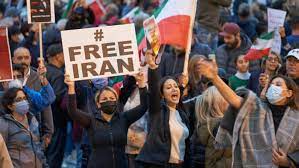Iran: Making and Breaking Human Rights History

Iran Human Rights Advocates
by Fran Briggs
No length of days, film, or reams of paper could capture the complexity and totality of Iran’s human rights revolution. Hence, I will examine the impact this movement has made over a 60-day period as space permits.
In today's Part One I address the following questions: Why is the revolt in Iran different from any other uprising in the country’s history? What demographic is best positioned to challenge the ancient culture and practices? And why whatever the Islamic Republic of Iran says to oppressed citizens is problematic.
In next week’s Part Two I will examine why liberty no longer remains an elusive goal for many Iranians. I will also discuss how support for reform and freedom for Iranians became an unprecedented and historic breakthrough as it pertains to the assembly of citizens.
On Sept. 2022, 22-year-old Iranian Mahsa Amini was arrested for wearing an improper hijab (head scarf). She later died while in the custody of Tehran’s morality police after allegedly slipping into a coma.
Had Amini lived in north Tehran among the privileged elite she would be unlikely to experience such a fate. Communities consist of high-rise buildings, business towers, million-dollar vehicles, and other luxuries.
Azadeh Moaveni, an Iranian-American writer, journalist, and academic says north Tehran is home to families of government officials and can choose not to wear the hijab. Women dine, drive, and wear midriffs while their hair is uncovered.
In response to Mahsa Amini’s willfully ignored human rights, subsequent suspicious death, and Tehran’s morality police historic entrenched weapons of oppression, 80 cities in Iran began to revolt with protests and demonstrations.
The morality police and Iran’s government quickly faced entrenched opposition—mostly by women. However, children and men increasingly joined the revolt. Together, they created an epic, united front against extrajudicial disappearances, executions, and other widely enforced crimes against humanity.
The events that led to Mahsa Amini’s death revolutionized a revolution to challenge Iran's parliament and its crimes against humanity.
School girls carrying backpacks and sporting sneakers joined the movement. They scolded and taunted a male employee for lacking honor before he fled the school’s grounds. Then, they marched down a street in the nation’s capitol flinging their school uniform veils in the air. Youth of both genders know they risk being placed in mental institutions for opposing the government of the Islamic Republic of Iran.
Adult dissidents are unjustifiably interrogated, prosecuted, and arbitrarily detained for exercising basic human rights. Among these individuals are dual nationals, attorneys, educators, protesters, journalists, dissidents, artists and writers. Judicial consequences include torture, amputations, flogging, and corporal punishment.
In America, hundreds of thousands of Iranian Americans are expressing grief and outrage.
“The morality police and the implementation of the rules regarding clothing depend on who the president is at the time," explained a 50-year-old Iranian American and San Francisco bay area resident who says that Iran's rules and laws are arbitrarily enforced. "This is my understanding. For example, no woman is allowed to walk around showing hair, but how much hair they can show depends on who is in power.”
Medieval concepts, the hijab, and human rights violations are not the sole contributors to Iran's civil unrest. In a July, 2022 interview with an Iranian news source, Sasan Fayazmanesh, Professor Emeritus of Economics at California State University, Fresno said that an ailing Iran economy, sanctions imposed by the U.S. and their allies, an election process that gives a delusion of legitimacy, and devaluation of the Iranian currency have all contributed to the woes and frustration of citizens.
"Nevertheless, this new generation’s demonstrations appear to be the harbinger of things to come," stated Fayazmanesh.
The rhetoric of Iran's regime officials is designed to create an illusion of freedom and inclusion.
This is problematic because it overtly insults the intelligence, suppresses the civil liberties, and adds to the mental anguish of Iran's citizens. And, as long as the government of the Islamic Republic of Iran chooses not to validate the voices and choices of its citizens, it will unfavorably impact the likelihood of a trusted connection.
This concludes the first of two segments of Iran: Making and Breaking Human Rights History. My hope is that the world will read this and add to the depth and understanding of what it means to live in Iran today. My hope is that many will be moved to advocate for their human rights in some capacity.
The time has come once again to embrace our strengths and become who we were destined to be.
###
Fran Briggs is an investigative reporter, award-winning journalist, and publicist who is based in Yuma, Arizona. She works across the private, public, and philanthropic sectors where she designs and develops concepts, brands, and content for clients and her own entities. She is an advocate for human rights, spiritual freedom, political freedom, inspiration, education, physical fitness, health, and nutrition. Fran contributes to television, radio, newspapers, and broadcast platforms. Her work has been featured on and in, CNN, FOX, ABC, NBC, CBS, Oprah, Boxing Scene, Wall Street Select, Black Enterprise, Self Magazine, and more. Prior to entering the literary field, she held positions as a mental health rehabilitation specialist and account manager for Philip Morris, USA.
Fran Briggs
eMediaCampaigns!
+1 928-275-1342
email us here
Visit us on social media:
Facebook
Twitter
LinkedIn
Legal Disclaimer:
EIN Presswire provides this news content "as is" without warranty of any kind. We do not accept any responsibility or liability for the accuracy, content, images, videos, licenses, completeness, legality, or reliability of the information contained in this article. If you have any complaints or copyright issues related to this article, kindly contact the author above.
